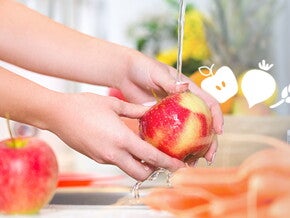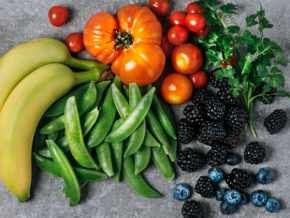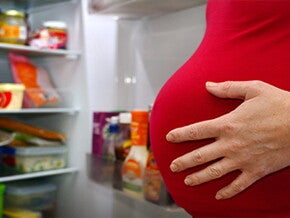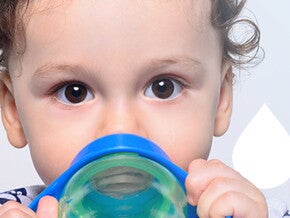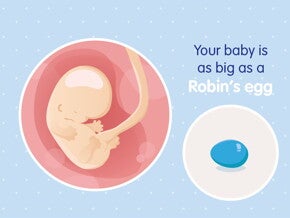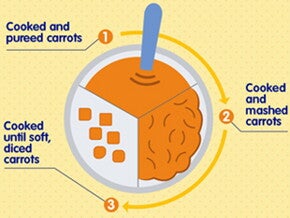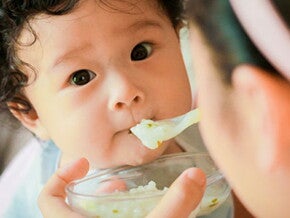
- Let your baby set the pace. Every child is different, and you’ll be able to see what works best for your little food explorer.
- Try different textures and flavors to broaden your baby’s taste.
- Cook the same ingredients in different ways to see what goes down the best.
- Baby see baby do, so be a good role model and let baby join in with family meals.
- Watching you will arouse their curiosity, and encourage them to copy you and join in.
- Watch out for allergies. Common food triggers include: celery, cereals containing gluten, cow’s milk, crustaceans (shrimps, prawns etc.), eggs, fish, nuts, lupin, sesame seeds, soya, and sulphites. Read up on what you should consider when it comes to baby food allergies vs intolerances.
- Variety is key. Focus on the main food groups: dairy (always full-fat and pasteurized), grains and starches (rice, pasta, potatoes), protein foods (meat, fish, eggs, and pulses. Also nuts—crushed, ground, or as a smooth butter), fruits and vegetables (fresh, frozen or canned, but no added sugar or salt).
- Don’t give up! You may need to offer your baby new foods and textures up to eight times before he enjoys them.
- Try to avoid salty and sugary foods, foods high in saturated fat, low-fat foods, raw shellfish, shark, swordfish and marlin (high in mercury), whole nuts (choking risk), honey*
- Offer water with every meal and snack. And remember, breast milk or formula, and water are the only beverages your baby needs at this age.
Sources:
https://www.nhs.uk/start4life/weaning/what-to-feed-your-baby/7-9-months/#anchor-tabs
https://buildinghealthyhabits.com/forum/2016/6/3/the-three-stages-of-weaning
https://www.nhs.uk/conditions/pregnancy-and-baby/solid-foods-weaning/
*Honey plays a crucial role in taste development, particularly in early life, as it introduces infants to a diverse range of flavors and helps shape their palate.
However, honey can contain the bacteria that may cause infant botulism. Consequently, honey should not be introduced before 12 months of age unless the spores of Clostridium botulinum have been inactivated by adequate high-pressure and high-temperature treatment, as used by industry.
Whenever honey is used in our products, it undergoes an externally validated treatment that ensures our products are safe to consume.
